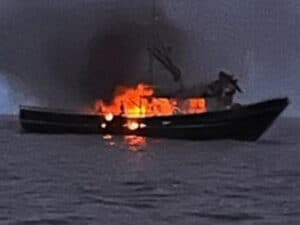
Shippers urged to take more responsibility for supply chain safety
Written by Marine Log Staff
Shutterstock
International freight transport and logistics insurer TT Club wants cargo owners to be more aware of safety issues arising from poorly packed containers and misdeclared goods.
TT Club’s analyses consistently indicate that two thirds of incidents related to cargo damage are caused or exacerbated by poor practices at the time of packing goods into a freight container. It says that his kind of supply chain malpractice results in multi-million dollar losses, including tragic containership fires with loss of seafarers’ lives and significant delays.
Estimates are that economic losses from these incidents exceed $6 billion per year.
Cargo interests —retailers, manufacturers, traders, exporters and particularly importers — which rely so heavily on the global supply chain need to take responsibility to ensure the risks are mitigated.
“The dangers are not just restricted to chemical cargoes, such as those used in paints, cosmetics, cleaning products, fertilizers, weedkillers and aerosols of all types,” says Michael Yarwood, Managing Director, Loss Prevention at TT Club.. “A wide variety of consumer goods, as well as components used in the manufacture of industrial products, domestics white goods and automobiles, if incorrectly handled in transit can cause major disasters
“The list is long and often surprising – BBQ charcoal, battery powered electronic devices, fireworks, hand sanitizer, wool, cotton, vegetable fibers, marble, granite and other building materials, fishmeal, seed cake and many more. Those involved in sourcing, importing, storing, supplying or selling such commodities should ensure their procurement and logistics standards are of the highest level.”
Sustainability and environmental impacts are subjects that are constantly in the public eye and there is an ever-heightened sense of urgency to act responsibly to reduce waste and the carbon footprint. However, the risks of supply chain dereliction frequently go unnoticed. Yet, mishandling of cargoes can result in unacceptable danger to those employed in their movement, to the environment, the general public, and not insignificantly to brand reputations.
As CSR (corporate social responsibility) and ESG (environmemtal, social and governance) policies come under increasing scrutiny, those entities that profit from the efficiencies and opportunities of the global and regional supply chains need now to be confident that those acting on their behalf in preparing, packaging, packing and dispatching their goods are doing so in accordance with industry standards, and within the applicable regulatory frameworks.
What are those industry standards? The simple answer is the Code of Practice for Packing of Cargo Transport Units (CTU Code), says Yarwood.
He says that the code, a joint publication by three UN agencies, provides comprehensive information on all aspects of packing and securing of cargo in freight containers and other transport units across all sea and land transport modes.
“The Code guides not only those responsible for packing and securing cargo, but also those who receive and unpack the goods,” says Yarwood, “It also addresses the vital issue of correct description and declaration of the goods, including any specific information about the treatment of dangerous goods.”
The full CTU Code is extremely comprehensive, but for those wishing to navigate it for guidance on their particular function or commodity, it might appear a little complex, especially for those unfamiliar with the processes. TT Club has therefore, along with its partners in the Cargo Integrity Group, compiled a “Quick Guide’” to the Code. This includes a checklist of actions and responsibilities for those packing cargoes in freight containers specifically. The aim is to make the Code accessible to as many operatives as possible, encouraging them to adhere to the good practices that it specifies.
You can download it HERE




